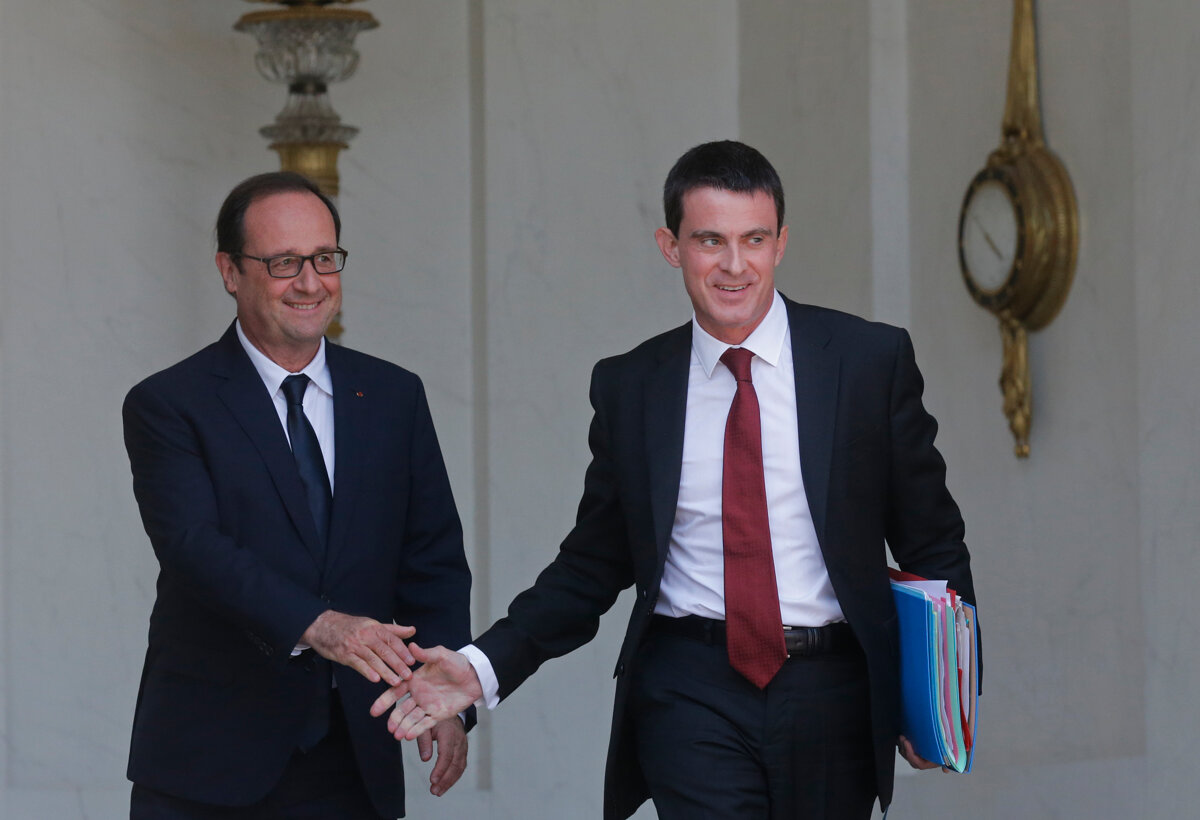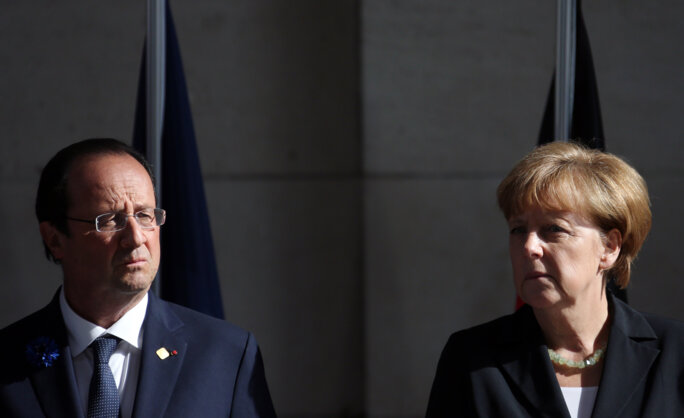It was a warning of the danger to come. “There is a real deflationist threat in Europe,” President François Hollande said in an interview with French daily Le Monde earlier this month. “In France, inflation has never been so low.” Two days earlier, on August 1st, a French government pre-summer break seminar at the Elysée Palace was presented with depressing economic forecasts, and it was as if Hollande felt the need to publicly flag up, without delay, that the ground was crumbling below his feet.
Addressing the press after the seminar, his prime minister, Manuel Valls, was no less alarmist about the future, warning of a “difficult economic situation” looming for when the nation returns from summer holidays in September. “In mid-August we’ll virtually have the figures for growth for 2014, as well as the figures for inflation,” Valls said. “One can note, and I do note, that at a European level growth and inflation fall short of what we could have hoped for. The gap is growing between the eurozone and the rest of the world. The risk of deflation is real.”

Enlargement : Illustration 1

The August 1st seminar should have been nothing other than a traditional update meeting ahead of the ministerial holidays. But according to several well-informed sources contacted by Mediapart, it was a watershed moment. The dark scenario unveiled before those present was one in which all the government’s earlier predictions, all its hopes of recovering public confidence, all its pledges to rein in budgetary deficits and its plans to recover industrial competitiveness, appeared to be reduced to nothing in face of the fast-degrading economic situation in Europe.
“François Hollande seems to have discovered the profound breach created by the 2008 crisis,” said one source familiar with what went on at the seminar, speaking on condition of anonymity. “He’s just understood that all the economic scenarios learnt 40 years ago are no longer valid.”
Another source, close to the government and who also asked not to be named, gave a different and scathing interpretation: “François Hollande knows very well that everything has changed. But he has played tricks with the truth. Now his lies have caught up with him. He can no longer duck around, raising the prospect of a return to growth, a recovery in employment that never happens. He’s got his back to the wall.”
What the government discovered during the seminar was anything but a surprise. Numerous economists, including Joseph Stiglitz, have for a long time warned European leaders of the dangers of imposing everywhere budgetary austerity measures at the same time as monetary restrictions, arguing that this could only lead the eurozone into deflation. The International Monetary Fund (IMF) and the Organisation for Economic Co-operation and Development (OECD) have both over recent weeks published several reports sounding the alarm over the situation in Europe.
The forecasts prepared by the French economy and finance ministry’s treasury department which were presented to the French government seminar were sobering: the eurozone, with zero growth and an almost-zero inflation rate (0.4%), is sucked into a deflationist spiral. The problem is far from limited to southern Europe – it now affects the zone’s powerhouse, Germany.
There are early indications of the problems yet to come. Deutsche Bundesbank president Jens Weidmann, in an interview with German daily Frankfurter Allgemeine Zeitung published on July 30th, he said he was in favour of a rise in wages in Germany, and suggested that a hike of 3% would be desirable. His comments were incomprehensible for much of the German economic establishment, both for employers and trade unions alike, who for ten years have regarded moderate wage agreements as the path that has led to economic revival. If the president of the Bundesbank, keeper of the faith of strict monetary orthodoxy, has now broken with his firmest principles then there can be little doubt that these are grave times.
Since Weidmann’s comments, data has been published illustrating how Germany, contrary to its hopes of remaining an island of prosperity within a ravaged eurozone, is now in turn caught up in the debacle. The German statistics office Destatis last week announced that industrial orders fell by -3.2% in June compared with the previous month. Meanwhile, industrial production in June grew by just 0.3%, while analysts had forecast the growth would be 1% after its unexpected fall of -1.7% in May. These initial figures raise fears that Germany will see only slight economic growth in the second quarter, and perhaps even none at all in the third quarter - especially given that the slowdown began before the Ukranian crisis and the sanctions taken against, and by, Russia.
The members of the French government meeting on August 1st, even those the least familiar with economic matters, needed no explanation to understand the miserable forecasts. If Germany is slowing down, all of Europe will be dragged down. All the hopes of a return to healthy economic growth in France are reduced to ashes. The so-called tax credit for competitiveness and employment (le crédit d’impôt pour la compétitivité et l’emploi , or CICE) offered to companies, with the tens of billions of euros that the government is about to grant business in the hope of stimulating growth and job creations, is now in danger of being spent at a total loss. For it will be impossible to halt the rising unemployment figures within the context of a European depression.
According to investigative weekly Le Canard Enchaîné, French finance minister Michel Sapin told the seminar that “if we’re above 0.5% growth by the end of the year, that’d already be good”. Sapin subsequently denied the report, confirming his forecast of 1% growth for France in 2014. But the IMF, the OECD and ratings agency Moody’s have already reduced their growth forecasts for France this year, to 0.6% at best.
But according to well-informed sources contacted by Mediapart, much more depressing forecasts were presented at the seminar. According to the French national statistics office INSEE, French industrial output fell by 0.5% in the second quarter, despite a 1.3% rise in June – which followed a -1.6% fall in May. The coming months promise to be much more difficult. Business surveys indicate a constant fall in orders, with company bosses deploring the fall in consumption - a more significant problem in their eyes than labour costs. Credit demand has stagnated since the beginning of the year, while building permits and public construction tenders have also fallen. Local authorities in France, the principle sector of public investment, worried about the perspective of increased public spending cuts and concerned at the effects of the new regional reforms, have widely frozen investment projects. Some have even begun reducing their operating budgets.
“Michel Sapin has understood that he has a problem,” commented a source close to government. “Without growth, it is impossible for him to turn around public accounts and bring the budgetary deficit down to 3.8% [of GDP] as France has pledged to the European Commission. It’s the government’s credibility that is at stake.”
The finance ministry has known for some time that it is not in line with budgetary expectations. There is a repeat of the same scenario as that of 2013, namely that the fall in economic activity has seen a shortfall in revenue. In mid-July, business tax income was just 41.2% of the target figure instead of 50%, while VAT returns were at 48.6%, despite the fact that targets were lowered in the rectified Finance Act. Only income tax revenue is above that forecast.
“The Finance Act was based on estimations of 1% growth and 1.2% inflation,” said an expert in public finances, whose name is withheld. “That’s completely unrealistic. If you lower the forecasts to bring growth down to 0.5% and inflation to 0.5%, which wouldn’t be bad, that means 10 to 15 billion euros less in revenue.” The source said the 2014 budget deficit was, in his opinion, likely to be 4.3% of GDP instead of the government’s pledge of 3.8% of GDP.
Will the government announce new austerity measures, with more spending cuts, to meet European Commission demands and to honour France’s budgetary pledges? Or could it introduce a radical change in its policies, and convince other European states to force a halt to austerity programmes? “One cannot say that there is lively economic debate within the heart of government,” said a well-informed source. “It’s more a case of disarray.”
According to several sources contacted by Mediapart, economy minister Arnaud Montebourg has attempted to launch such a debate. For some months, Montebourg, who is also industry minister, has been urging a change of direction in economic policymaking, insisting that without growth there can be no balancing of public finances. In a speech before business representatives and trades union officials last month, Montebourg made known his preference for measures which would increase purchasing power and stimulate demand.

Enlargement : Illustration 2

According to sources, Montebourg told the government seminar that the unpleasant truth should be told clearly; that the government could no longer promise growth and a fall in unemployment if it continued with its current policies. He believes that the problem lies at a European level, and that demands for austerity programmes and budgetary restraint are sentencing the eurozone to a decade of stagnation. The economy minister, according to the sources, argued that economic growth was a political issue, and that the Left still had an opportunity to take a lead.
“Arnaud Montebourg is convinced that at some point Germany will react if it is in turn hit by deflation,” said a source close to the minister. “For him, it is important that France doesn’t wait for decisions in Berlin and find itself trailing behind, but that it preempts the debate so that solutions that don’t suit it aren’t forced upon it.”
Mediapart understands that finance minister Michel Sapin kept a cautious silence after Montebourg’s contribution during the seminar, while it was foreign minister Laurent Fabius who called for the government to continue with its economic policies. Fabius said this was necessary for the country to maintain its credibility and, echoing comments from Germany and the European Commission, argued that France must see through the reforms that it had pledged to make and not pretend its weaknesses come from elsewhere, warning that otherwise France would be hurt by the financial markets.
Ever since François Hollande’s election in May 2012, he and his government have lived in fear of a speculative attack against France, like those suffered by Spain, Italy and Portugal. The threat was repeatedly brandished by Sapin’s predecessor Pierre Moscovici as a reason for France to align its policies with those championed by the European Commission. Pressure against the eurozone has eased over the past 18 months thanks to the intervention of the European central Bank (ECB). French rates have never been lower.
But what would happen if deflation was to enduringly affect the eurozone, if the markets would again react to the huge public debt in certain countries like Italy, and if France began tumbling again? Before the recent jump in geopolitical tensions around the globe, Prime Minister Manuel Valls and presidential office chief-of-staff Jean-Pierre Jouyet began receiving information from allies in the business world warning them to the difficulties ahead that corporations are forecasting. A major retail chain, listed on the CAC 40, the benchmark French stock market index, has ordered its finance department to look after all funding as of now, rather than depend upon the market in 2015. Another corporation, an industrial group, has also begun taking its precautions in case the markets are completely closed down next year.
It appears that these warnings have been taken very seriously, and that the government is once again living in fear of the markets, and this is cranked up by the recent somber economic forecasts for the autumn. It must decide whether it can calm the markets and avoid attack by continuing firmly with current policies, as argued by foreign minister Laurent Fabius, or follow economy minister Arnaud Montebourg’s choice of ditching them to bring back growth.

Enlargement : Illustration 3

Valls’ once high popularity ratings have vanished like snow under the sun since he was appointed prime minister in April. On the eve of the August 1st government seminar, an opinion poll published by French daily Le Figaro found that whoever would stand for the ruling Socialist Party in the next presidential elections due in 2017, none would reach the decisive second round. Valls, who a number of observers regard as a potential presidential challenger, and whose political future is now at stake, appears to have become increasingly convinced in recent weeks that his government should change its economic direction. “Manuel Valls is hesitating between being a prime minister loyal to François Hollande, or to rebel,” said a source close to the French prime minister. “He’s waiting to know more about François Hollande’s position.”
That might not be an easy task, according to the account given by one of the seminar’s participants, whose identity is withheld. “As is his habit, François Hollande is evasive,” said the source. “He appeared very bothered. He said that the [policy] line should be maintained and that clear decisions must be taken which are understood by the French.” Since the seminar, the Constitutional Council has ruled against one of the few measures clearly understood by many, namely a boost in purchasing power for the worse-off, delivering yet another blow to the government. This concerned a planned reduction in social charges for those earning less than 1.3 times the minimum legal wage, and which the Council judged to be “contrary to the principle of equality”.
The ministers can only have left the seminar with major concerns about the near future and without knowing what the government’s policy direction will be. In the meantime, Hollande has made a muddling attempt to pressure Germany into helping French growth. Following an interview published in Le Monde last week, when he said he wasn’t appealing for German “indulgence” but wanted more to be done to boost growth, a deputy government spokeswoman in Berlin, speaking in place of Chancellor Angela Merkel who was on holiday, told reporters: “Germany is already the most important engine of economic expansion in the euro zone,” and that “the rather general statements coming out Paris provide no indicator for the [German] government to correct any of its economic policies.”
One well-informed observer believes France has passed up a major opportunity in Europe upon Hollande’s election in 2012. “If France wants to obtain a change in Europe’s politics, it won’t obtain it by begging before Germany, but by building an alliance with other European countries,” said the source. “The trouble is that it missed the train in 2012. All of southern Europe was waiting for France and was ready to follow it. François Hollande preferred to sign up to the budgetary stability pact without discussion, and to promise to bring down the deficit to 3% [of GDP]. France lost all its credibility. Since then, Italy has chosen its own path. Spain has come into line behind Germany. No-one anymore is expecting something of France.”
It would appear that while the offices of the president and prime minister weigh up the political route ahead, it is small manoeuvring that is leading the way rather than a grasping of a new vision that would restore confidence and do away with the ambient defeatism. “If Manuel Valls does not obtain a change in policy [after the summer break], he has nothing left but to resign,” commented a source close to the prime minister. “Otherwise, he’s politically dead,” added the source, who says he has sent the very same advice to Valls in a mobile text message.
-------------------------
- The French version of this article is available here.
English version by Graham Tearse


